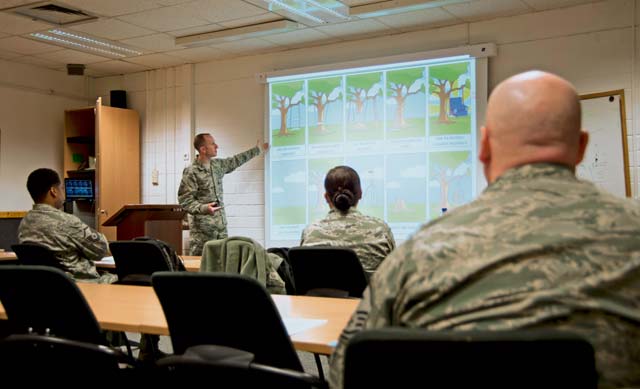
First sergeants and front-line leaders from Ramstein participated in a resilience training assistant course Nov. 12 to 15 on Ramstein where they were trained to teach a variety of resilience techniques to Airmen in their organizations.
The course is offered every quarter for Airmen interested in becoming resiliency trainers in their organizations, however, this was the first time the master resilience trainers prepared the course specifically for first sergeants.
“One thing we can expect constantly in life is change,” said Col. Lee Smith, 86th Airlift Wing vice commander. “That is why it is so important for Airmen to have the physical, emotional and mental health to withstand, recover and grow in the face of life’s challenges. That is what Comprehensive Airman Fitness is all about, giving Airmen physical, emotional and psychological stamina to deal with adversity (and) helping them to be more resilient, and our master resilience trainers and training assistants play a critical role in that.”
At the beginning of the course, the master resilience trainers discussed a variety of topics, including counting your blessings, balancing your thinking and accomplishing goals. These lessons are focused on providing new perspectives, allowing Airmen to broaden their understanding.
“We’re all resilient people in the Air Force, but we don’t start off that way,” said Capt. Eric Brown, master resilience trainer. “Many of us learn these skills as we go through life. The earlier and more often we learn them from other people, the more resilient we will be.”
In order to effectively teach resiliency, the students became the teachers during the second half, teaching core lessons to their peers. This allowed them to receive feedback on their teaching style from the master resilience trainers and other students.
“This four-day course is a shortened version of the two-week course that we went through at McGuire,” said Tech. Sgt. James Vest, master resilience trainer. “Our goal is to spread Comprehensive Airman Fitness throughout Ramstein. The more people we teach, the stronger our Air Force will become.”
Though the course is condensed, Master Sgt. Bruce Haskin, U.S. Air Forces in Europe and Air Forces Africa NCO Academy director of resources and additional duty first sergeant, noted that the material was extremely valuable and the teaching methods allowed him to exercise the knowledge he gained.
“It was great having the chance to teach in front of my peers,” Haskin said. “I got to teach interpersonal problem solving, which helps us to deal and communicate with other people. This is a necessary skill in building and preserving relationships, both at home, work and with other nations. It has already helped me out in my day-to-day life.”
Students were also taught physical resilience, spiritual resilience and good listening. This knowledge not only assists them in remaining resilient, but ensures they have the right training to impact Airmen.
“One of the key components Air Force leadership has been focusing on for the last few years is the resiliency of our Airmen,” said Chief Master Sgt. James Morris, 86th AW command chief. “Our Airmen are very resilient, accomplishing the mission every day, but with the tools this resiliency course offers, our front-line leaders can better guide Airmen to make wise decisions when confronted with life’s challenges.”
This course is a stepping stone in building a more resilient Air Force. The master resilience trainers are always looking for Airmen to set up and become trainers. Ramstein has five master resilience trainers for the entire base, who not only work with Comprehensive Airman Fitness training but their primary jobs as well. Having RTAs helps spread the resiliency knowledge and build stronger Airmen.
For more information on becoming an MRT or RTA, call Jan Devitt, 86th Airlift Wing community support coordinator, at 478-8630.







